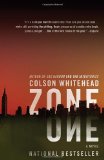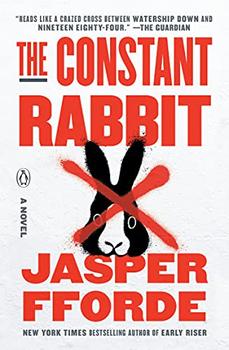Summary | Excerpt | Reviews | Beyond the book | Read-Alikes | Genres & Themes | Author Bio

A Novel
by Colson WhiteheadAs a child, "Mark Spitz" (the ironic nickname of the otherwise unnamed main character who can't swim) dreamed of living in Manhattan, captivated by the bright lights and soaring buildings of his family's visits to his Uncle Lloyd. Ultimately, he does make it to New York City but not in the way he imagined he would. Instead of a modern luxury apartment, his home is "Fort Wonton" in former Chinatown; rather than a career as a lawyer, his profession involves killing undead stragglers left after a first pass by the military. This is not the stuff of childhood dreams. It's nightmarish. And Spitz's childhood love of monster movies adds yet another layer of irony to his fate as a zombie hunter.
Colson Whitehead's post-apocalyptic, dystopian zombie novel is a complex mix of mischievous irony and grotesque imagery, sprinkled with violence, alternating hope and desperation. It isn't a work easily defined by any one genre. On the surface it's a tale of survival in a world taken over by zombies that eat and infect those who stumble across their paths versus those who battle to take back the world.
Delving more deeply, it becomes apparent Whitehead takes particular pleasure in playing with his readers. This masterful, award-winning writer tells jokes with such a straight face it's disarming. His humor is dry, so understated it takes the reader aback wondering what his intention really is. The answer? He's flexing an extremely well developed writing muscle, pulling off a very difficult, advanced style, producing a multi-layered novel of slyly deceptive depth.
Ludicrous details like a former porn star becoming the head of what's left of Italy, distributing glamour girl shots of herself to raise morale like some post-apocalyptic Rita Hayworth, showcase the author's wry wit. During the initial horror and pandemonium - the government claiming the whole thing was an isolated terror attack - commuters become alarmed, not when police cars surround their train, but when they start losing internet connectivity. No wonder the hopeful term for eventually restarting the world is referred to as a "reboot."
Whitehead is in his element poking fun at modern life, particularly adept at getting in subtle digs without crossing the line into parody or overt sarcasm. But it isn't all social satire. The story is also poignant, and there are occasional moments of tenderness. Each survivor carries a "Last Night" story, a memory of the final moments of blessed ignorance before the world fell apart and the extent of the horror became clear. As they share their stories, so does Whitehead expand the depth of character development; he compares and contrasts the experiences of those from different walks of life, thrown together by universal pandemic.
The result is a cross-section of Americans battling a cross-section of the undead: the half-crazed, uninfected are barricaded in bunkers of their own making, and they shoot at anyone who comes near - friendly or not; the zombie "skels," are actively attacking and spreading the disease; and the horribly sad, doomed, and soulless infected, go through their last motions over and over, unaware they're even dead.
Zone One may not be Whitehead's finest novel, but it's a satisfying, riveting read. The beautifully long, descriptive sentences are richly sensuous, and the languid plot is driven by characters rendered life-like through the author's choice of third-person omniscient narration. Those in love with the written word will most appreciate Whitehead's magic. Lovers of zombie genre novels may find it less appealing. It's a story to be savored slowly, melting on the tongue like fine chocolate. While not a masterpiece, Zone One is a distinct cut above the average and an impressively multi-layered novel that is well deserving of praise.
![]() This review was originally published in The BookBrowse Review in October 2011, and has been updated for the
July 2012 edition.
Click here to go to this issue.
This review was originally published in The BookBrowse Review in October 2011, and has been updated for the
July 2012 edition.
Click here to go to this issue.

If you liked Zone One, try these:

by Jasper Fforde
Published 2021
A new stand-alone novel from the New York Times bestselling author of Early Riser and the Thursday Next series.

by Violet Kupersmith
Published 2015
These stories - based on traditional Vietnamese tales - blends the old world and the new with fantastical, chilling, and original explorations of the ghosts that continue to haunt us: those of the Vietnam War.
A library, to modify the famous metaphor of Socrates, should be the delivery room for the birth of ideas--a place ...
Click Here to find out who said this, as well as discovering other famous literary quotes!
Your guide toexceptional books
BookBrowse seeks out and recommends the best in contemporary fiction and nonfiction—books that not only engage and entertain but also deepen our understanding of ourselves and the world around us.